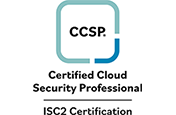Unable to find what you're searching for?
We're here to help you find itCertified Cloud Security Professional (CCSP) Course Overview
The Certified Cloud Security Professional (CCSP) course is a globally recognized certification program designed for IT and security professionals to validate their expertise in cloud security. It encompasses a comprehensive curriculum that addresses the best practices and standards for securing cloud environments. Through lessons on cloud computing concepts, Cloud reference architecture, and Security principles, learners gain a deep understanding of the architectural concepts and design requirements of cloud systems. The course also delves into Cloud data security, teaching students about Data lifecycle management, protection strategies, and compliance with data protection laws for sensitive information like PII.
Further, it covers cloud platform & infrastructure security, emphasizing the importance of disaster recovery and risk management. In Cloud application security, participants learn about Secure software development life-cycle and IAM solutions. The operations module prepares learners to manage cloud infrastructure, ensure Regulatory compliance, and handle digital evidence. Lastly, the legal & compliance section provides insights into legal risks, privacy issues, and Vendor management in the cloud. This comprehensive course equips professionals with the necessary skills to safeguard cloud environments effectively.
Purchase This Course
USD
View Fees Breakdown
| Course Fee | 2,990 |
|
Total Fees (with exam) |
2,990 (USD) |
USD
View Fees Breakdown
| Course Fee | 2,300 |
|
Total Fees (with exam) |
2,300 (USD) |
USD
View Fees Breakdown
| Flexi Video | 16,449 |
| Official E-coursebook | |
| Exam Voucher (optional) | |
| Hands-On-Labs2 | 4,159 |
| + GST 18% | 4,259 |
|
Total Fees (without exam & Labs) |
22,359 (INR) |
|
Total Fees (with Labs) |
28,359 (INR) |
Select Time
Select Date
| Day | Time |
|---|---|
|
to
|
to |
♱ Excluding VAT/GST
You can request classroom training in any city on any date by Requesting More Information
Inclusions in Koenig's Learning Stack may vary as per policies of OEMs
Scroll to view more course dates
You can request classroom training in any city on any date by Requesting More Information
♱ Excluding VAT/GST
*Inclusions in Koenig's Learning Stack may vary as per policies of OEMs
Suggestion submitted successfully.
Koenig Learning Stack
Inclusions in Koenig's Learning Stack may vary as per policies of OEMs



